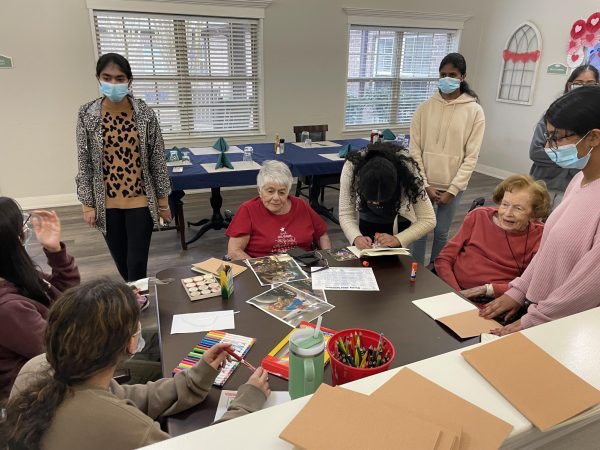Play Like a Girl: South Celebrates Female Athletes Signing with Colleges on National Women in Sports Day
Maggie Craig and Diya Maheshwari/The Birdfeed
Two of South’s female athletes hugging their coaches on Signing Day. South celebrated their female athletes on Signing Day in the gymnasium.
February 8, 2023
Over 50 years ago, Kathrine Switzer made history when she crossed the finish line at the Boston Marathon.
The year was 1967, and women weren’t allowed to compete in what was then an all-male race; the common belief was that women did not have the physical aptitude for a 26.2-mile endeavor. Switzer signed up for the race using her initials so officials falsely believed she was a man. During the race, an angry official attempted to physically rip her off the course when her gender was discovered.
Despite the many obstacles she faced, Switzer finished the marathon, making history and achieving icon status in the women’s rights movement.
Fifty-six years later, on Feb. 1, South Forsyth High School celebrated two female athletes as they committed to playing their sports at the collegiate level. Carmel Yonas committed to Georgia Institute of Technology to run for their Track and Field team, and Charlotte Brooks committed to Furman University to play Softball.
It was truly a coincidence that Winter Signing Day coincided with National Women in Sports Day, but it wasn’t a coincidence that South’s female athletes had the opportunity to feel noticed and awarded for their great efforts.
“[Softball] has definitely been a way for me to use my competitiveness and I really love that, but it’s also taught me discipline and responsibility,” Brooks said.
Yonas and Brooks are two of the 3.24 million high school girls who currently participate in a school sport across the U.S. and get to reap the myriad benefits, including increased confidence, better health, and the potential for collegiate scholarships. But this hasn’t always been the case.
For centuries, women have endured oppressive laws that prevented them from being equal with their male counterparts, but as time has progressed, so have those archaic rules. Athletic endeavors are no exception.
Women’s History
In nineteenth-century America, society frowned upon elite female athletes. For underprivileged women with athletic abilities and aspirations, there were limited sporting opportunities. For aristocratic women, tennis, croquet, archery and bathing beauty swimming were the only acceptable options at that time.
In 1900, the first female athletes were able to participate in the modern Olympics. Only 22 out of 997 athletes were women, and the only sports they were allowed to compete in were golf and tennis.
In the 1952 Olympics, women earned half the gold medals for the U.S. when Andrea Mead Lawrence, an alpine ski racer, won two of the U.S.’ four golds.
In 1972, the U.S. government enacted Title IX, a federal civil rights law which prohibits sex-based discrimination in any institution that receives federal funding, creating the basis of equal opportunity in scholastic athletics for all women and girls in the U.S.
Perhaps unsurprisingly, in just 20 short years, women dominated the 1992 Winter Olympics in France. Team USA consisted of 97 men and 50 women. Males once again outnumbered females, but not by as much as before. Female athletes dominated and won every single gold medal for which they competed.
Now, in the 21st century, women receive more representation in elite sports than ever before. At the 2021 Tokyo Olympics, Team USA sent 613 athletes – 329 of whom identified as female, the most female athletes ever sent by any country.
As of 2023, women’s rights have advanced far more than the pioneers in these spaces could ever fathom. Women now have the same opportunities as males to play their sport at the university level thanks to the work of trailblazers like Switzer and Lawrence.
A Community Effort
South’s 2023 Winter Signing Day coincided with National Women in Sports Day. During her speech at the beginning of the event, Assistant Athletic Director Shayla Brawner congratulated all the female athletes at South.
“I so grateful for all of the opportunities we have as [female] coaches and athletes to represent our sports, schools and communities,” Brawner said.
Brawner states that SFHS has had “11 female state championships in female sports” in recent years. She further described how the Forsyth County community helps support each female athlete’s hopes and dreams. She went on to explain how South Forsyth’s coaches constantly support every female athlete and make sure they feel just as supported as anybody else in sports.
In addition to well-known female athletics pioneers such as Switzer and Lawrence, many in attendance also credited the decades of unsung heroes who made Brooks’ and Yonas’ accomplishments possible.
“It feels empowering to just know that decades ago, women weren’t allowed to be in sports, and I love how it all started with one woman…[joining] the men’s team regardless of what everybody else was saying,” Yonas said.
National Women in Sports Day inspires girls and women to play, be active and tap into their full potential. As all women’s rights have progressed far more than previous pioneers could have ever imagined, dedicating a full day just to award female athletes is a tremendous leap for society both in the U.S. and around the world.










